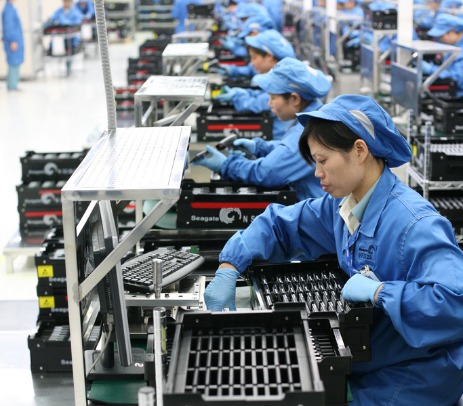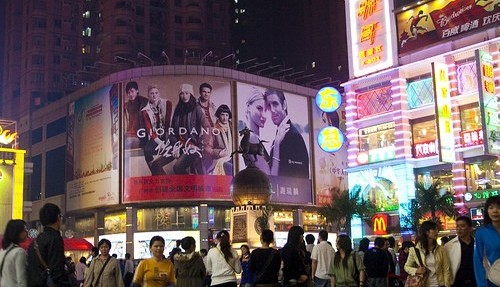There are more things in heaven and earth, Horatio,
Than are dreamt of in your philosophy.
— Shakespeare, Hamlet
 Assembly fine: These Chinese factory workers need to stop making and start buying. Or do they?Photo: Robert ScobleDoes the health of the U.S. economy depend on China becoming the “world’s next great consumer society”? The stellar economics reporter David Leonhardt argues as much in a recent New York Times Magazine piece on China’s failure to ramp up domestic consumption despite its roaring success in manufacturing.
Assembly fine: These Chinese factory workers need to stop making and start buying. Or do they?Photo: Robert ScobleDoes the health of the U.S. economy depend on China becoming the “world’s next great consumer society”? The stellar economics reporter David Leonhardt argues as much in a recent New York Times Magazine piece on China’s failure to ramp up domestic consumption despite its roaring success in manufacturing.
It’s a beautifully reported and argued piece, and has justly been lavishly praised. Anyone who wants to understand the challenges facing the globe’s rising economic behemoth must read Leonhardt’s long dispatch.
To his credit, Leonhardt in part frames China’s grotesquely unequal economic boom — a relatively small class of coastal elites grabbing most of the benefits — as a social-justice problem:
Saying that China does not have a big-enough consumer economy is really another way of saying that not enough of its resources reach the broad mass of its people. If they had more resources, they would surely spend more.
And Leonhardt takes a game shot at preempting the criticism I’m about to make:
A Chinese consumer society would improve the lives of hundreds of millions of people. The benefits of the industrial boom that began in the 1980s would spread more rapidly beyond the country’s eastern coast. The service sector would grow, and the economy would no longer be quite so dependent on smoke-spewing factories.
But he also frames China’s low overall level of consumption as a looming problem for the global economy:
For the rest of the world, the Chinese consumer is one of the best hopes for future economic growth. In the years ahead, when the United States, Europe and Japan will have no choice but to slow their spending and pay off their debts, China could pick up the slack. Millions of Americans — yes, millions — could end up with jobs that exist, at least in part, to design, make or sell goods and services to China. This possibility helps explain why Democrats, Republicans, economists, business consultants, corporate executives and labor leaders all devote so much time to urging China to consume more. One subtext of the recent G-20 meeting in Seoul was the encouragement of Chinese consumption.
That’s all very true. The U.S. economy is stumbling — unemployment clings near 10 percent and housing prices are falling anew. Almost 15 percent of U.S. households are defined by USDA as “food insecure” — a level essentially unchanged since 2008, when the food-insecurity level spiked. Our political class has no answer for the situation: A new round of tax cuts won’t boost the economy nearly enough, while spending cuts across the board will only further depress it. Thus the Great Recession may well be in its early stages.
Meanwhile, Europe is a basket case. A boom in demand from China would certainly help reinvigorate global economic growth.
The times they aren’t a’changin’
I find these terms of debate enormously depressing. While the financial system plunged into the abyss in fall 2008, the candidacy of Barack Obama took flight. At the time, I thought that those two factors — the meltdown on Wall Street, the ascent of a politician preaching change — might give rise to a serious rethinking of the old consumerist economic models.
In the scenario Leonhardt lays out, China will need to find its own China: other territories with vast pools of cheap labor on which to palm off low-end manufacturing; and new sources of raw materials.
There was a third factor: the specter of climate change. The post-World War II economic boom, and particularly the hyper-consumerist phase that developed in the 1990s, leaned heavily on subsidized, carbon-spewing dirty energy. Surely, with the Democrats ascendant on the national stage, new models would come to the fore?
I thought the time might be ripe for a multi-trillion-dollar public investment in a new, green economy: much-needed infrastructure for local and regional food systems; high-speed trains connecting cities; high-functioning mass transit within cities; a mass rollout of truly clean energy like wind and solar; smart grids; etc. Such a program would eliminate much of the misery of underemployement and food security by putting people to work. And it would have repaid itself by laying the groundwork for carbon-light, community-based economic development going forward.
And speaking of China, its vast hoard of dollars — acquired by selling us lots and lots of stuff — stood ready to finance such a public-investment boom at rock-bottom interest rates.
Unfortunately, nothing remotely like that has happened. President Obama immediately staffed his economic team with architects of the great financial bubble that burst in 2008. They promptly set to work patching up the old financial system. Two years since they took office, the banks are back in robust health and corporate profits are at, or near, all-time highs. Never mind that one in six workers is under- or unemployed. And then there’s Congress, which was foolishly fixating on a rigged-up “deficit crisis” even before the GOP stormed the House in the November. (For a devastating critique of deficit hysteria, see any recent article by University of Texas economist James K. Galbraith; here’s his latest.)
Now — back to Leonhardt — we’re left praying that the Chinese can get the U.S. working again out by buying lots and lots of stuff — presumably at least some of it made here. For Leonhardt, such a buying binge isn’t just necessary to spur a jobs recovery in the United States; it’s also the only path out of poverty for China’s billions of impoverished citizens. Citing economic history to make his case, Leonhardt writes:
Politics aside, China’s story is the classic one of economic development: investments in physical capital and education make a society more productive and are combined with a huge shift of people from farms to factories. England, Germany, the United States, Japan and South Korea have all followed the model over the last 250 years. The economist Gregory Clark, author of A Farewell to Alms, calls it the only story of economic development.
And after the shift to factories, wealthy nations shift to a high-consumption, import-sucking, services-centered white-collar economy — and that’s precisely where China needs to go next, Leonhardt implies. Leonhardt is essent
ially restating Margaret Thatcher’s famous dictum on corporate-dominated globalization: “There is no alternative.”
But is there really no alternative?
In the scenario Leonhardt lays out, China will need to find its own China: other territories with vast pools of cheap labor on which to palm off low-end manufacturing; and new sources of raw materials — like the “rare earth” deposits that keep China’s electronic-gadget mills humming — to exploit. As China gets richer in this fashion, the logic goes, it will start buying more of the high-end products the United States still manufactures, like airplanes and defense equipment, and the U.S. economy will get a boost in the process. And then “sustainable” global growth will have been restored!
Milton Friedman’s paradise is lost
The problem, of course, is that there’s nothing sustainable about about any of this. The 250-year period cited by Leonhardt has indeed been a time of dramatic economic growth in Europe and North America; but that very economic growth has triggered an unprecedented human-induced transfer of carbon and other greenhouse gases from the earth into the atmosphere. And that transfer is now perceptibly warming the planet, giving rise to a new period of unchecked climate chaos.
There is no alternative? There are alternatives, if we can imagine them.
Since the late 1970s, politicians from Reagan and China’s great reformer Deng Xiaoping to Obama today have embraced the creed of neoliberalism: the idea that economic policy should be driven by minimally regulated markets with the idea of maximizing economic growth as a goal unto itself. Deng himself famously revered Milton Friedman, the high priest of unfettered markets and growth for its own sake.
Now is the time for the globe’s economic policymakers, including our own, to put down their copies of Capitalism and Freedom and pick up the new book The Spirit Level: Why Greater Equality Makes Societies Stronger. In it, U.K. researchers Richard Wilkinson and Kate Pickett demonstrate that past a certain point, dramatic increases in wealth by no means translate to increases in the well-being of a nation’s citizenry. The real path to economic success, Wilkinson and Pickett show with overwhelming data, lies in tempering growth by distributing its benefits broadly through the population.
U.S. and Chinese economic planners alike have been utterly indifferent to this goal. (In The Spirit Level’s survey of industrialized nations, the United States ranks first in both income inequality and “index of health and social problems.”)
 Small-scale Chinese farmers are part of the solution, not the problem. Photo: Ewen BellOur economic gurus would also do well to consult much-cited, utterly ignored economic thinkers like Jane Jacobs and E.F. Shumacher, who by the 1960s could already see that unchecked corporate-led growth was eviscerating communities, destroying democracy, and burning through the Earth’s resources. Shumacher published Small Is Beautiful: Economics as if People Mattered in 1973, before the discovery of the greenhouse effect before the rise of scientific consensus around human-induced climate change. But he was already warning that there were limits to how much pollution the biosphere could absorb before changing in unpredictable and perilous ways. And he argued that Western societies were treating fossil fuels as income to be expended, and not precious capital to be preserved.
Small-scale Chinese farmers are part of the solution, not the problem. Photo: Ewen BellOur economic gurus would also do well to consult much-cited, utterly ignored economic thinkers like Jane Jacobs and E.F. Shumacher, who by the 1960s could already see that unchecked corporate-led growth was eviscerating communities, destroying democracy, and burning through the Earth’s resources. Shumacher published Small Is Beautiful: Economics as if People Mattered in 1973, before the discovery of the greenhouse effect before the rise of scientific consensus around human-induced climate change. But he was already warning that there were limits to how much pollution the biosphere could absorb before changing in unpredictable and perilous ways. And he argued that Western societies were treating fossil fuels as income to be expended, and not precious capital to be preserved.
Shumacher and Jacobs sketched out visions of intertwined local and regional economies that employ what Shumacher called “appropriate technology” in ways that benefit communities and preserve resources for future generations. High living standards, they show, can be maintained without plundering resources and destroying the environment.
Policy apparatchiks in Washington and Beijing alike would also do well to heed the work of contemporary food-economics intellectuals like Ken Meter and Michael Shuman. Everyone eats every day; in a globalized food system, food dollars leak out of a community, draining wealth and accumulating it elsewhere. Food, Meter and Shuman show, could be a powerful tool for local economic development in rural and urban areas alike.
Even after its 20-year growth blitz, China still houses hundreds of millions of smallholder farmers. In standard economic thinking, they are a problem, to be solved by purging them from the land and sending them off to factories in cites, leaving behind a few scaled-up, highly polluting mega-farms. Meter and Shuman show how those farmers could instead be pillars of revitalized, green regional economies.
The time for new economic thinking is now. The neoliberal orthodoxies are being discredited before our eyes, even as the planet heats up and the Great Recession congeals into lowered living standards for millions of Americans and their offspring.
Yet in Beijing, in Washington, and even among our best economics reporters like Leonhardt, the old thinking lurches on. If China does bail us out by transforming into a U.S.-style consumption machine, I tremble for the future of our race.




